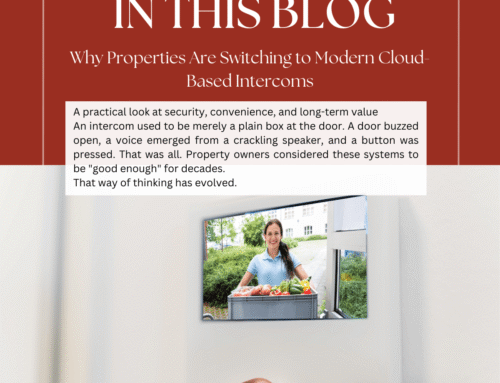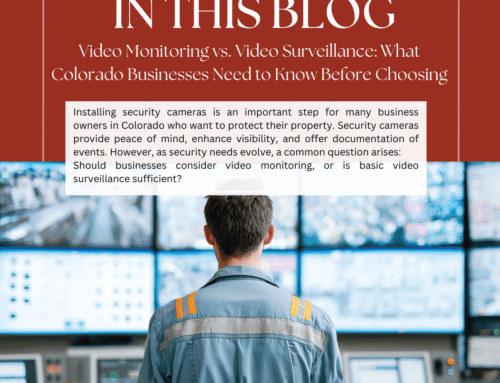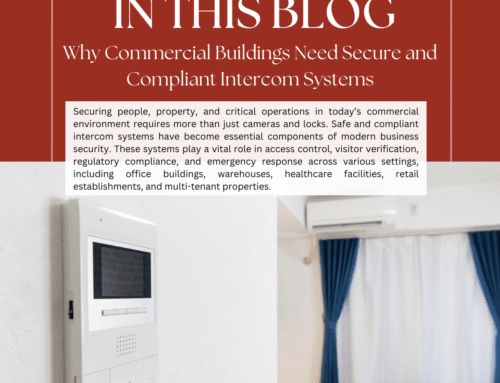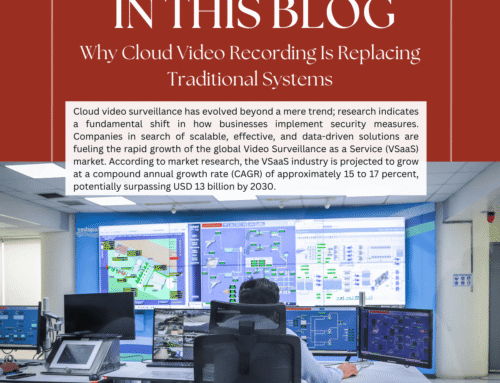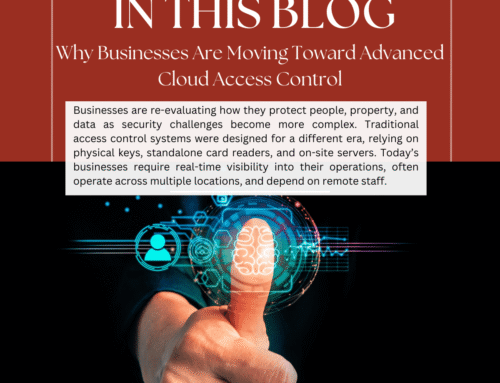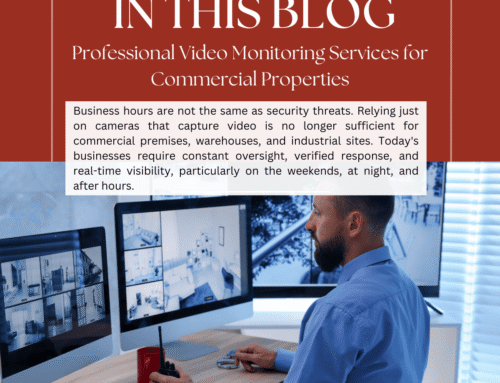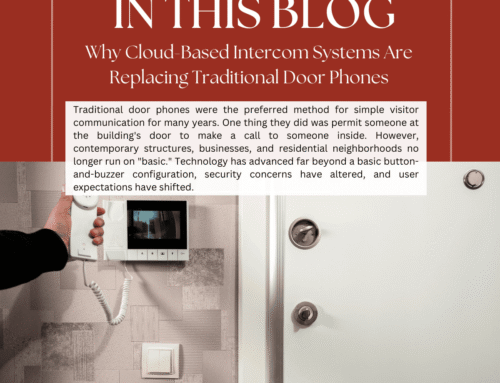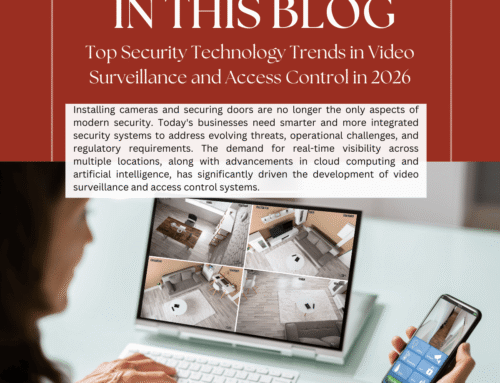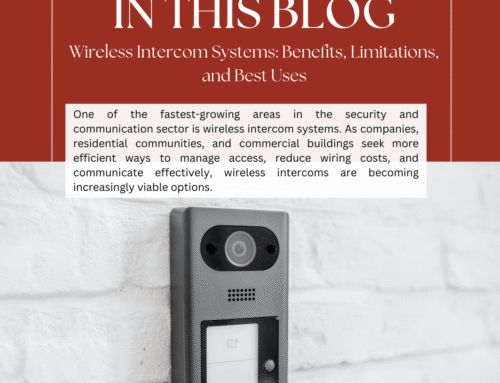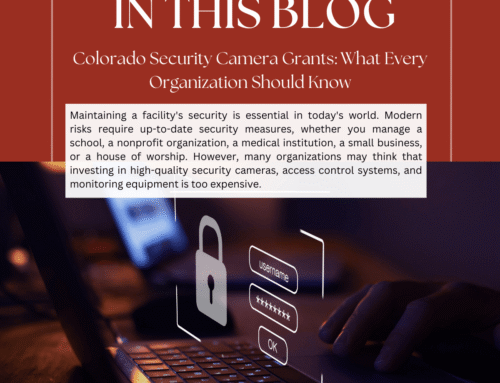What is Access Control, and Why Does Your Business Need It?
Controlling who accesses your property is now essential in Colorado’s rapidly expanding business environment, which includes multi-tenant residential complexes in Colorado Springs, downtown Denver workplaces, and Boulder tech companies. Modern access control systems are now an essential component of physical security due to the increase in internal threats, unlawful entrance, and workplace liability.
Access control refers to the set of rules and technology that establishes who can enter, where they can go, and when they may do so. Modern systems include keycards, mobile credentials, biometric scanners, and cloud-managed platforms, in contrast to traditional keys that may be lost or cloned. Access control solutions are crucial to everyday operations, compliance, audit preparedness, and safety in Colorado, where companies often operate across multiple locations and in high-traffic areas.
More than 48% of enterprises already utilise electronic access control systems to monitor building entrances, according to SDM industry research. Furthermore, according to 56% of the security professionals polled, access control expenditures are expected to rise, particularly in corporate settings, commercial buildings, and medical institutions.
Serving Colorado since 2006, Security Surveillance System (SSS) has direct experience with how access control works in tandem with intrusion alarms, audit management, and surveillance to safeguard companies from internal and external threats.
Why Access Control Is Getting Widely Considered by Colorado Businesses
The business sector in Colorado has particular difficulties:
- More people visit anonymous buildings in areas like Denver, Aurora, and Lakewood as a result of urban growth.
- Demand-controlled tenant and visitor management for mixed-use properties (residential and commercial).
- Strict access logs are required by industry regulations (HIPAA, PCI-DSS, and legal secrecy).
Research indicates that operational need is replacing physical security as the primary reason for access management. Nowadays, it’s more important to trace movement, avoid responsibility, and establish digital accountability than it is to just shut doors.
Colorado Local Risk Factors
Access control is crucial because Colorado businesses confront a distinct set of regional threats. Keycard and biometric systems are essential for monitoring employee entrance since office settings in places like Denver and Boulder have to deal with internal theft and unlawful access. In order to safely manage tenants, guests, and delivery staff without harming common spaces, multi-tenant properties, which are prevalent in Aurora and Colorado Springs heavily rely on mobile credential access. In order to keep unauthorized people out of staff-only areas, the retail and hotel industries frequently use visitor badge management and intercom-based access. Furthermore, automatic access logs and time-stamped entry records are essential for regulatory audit-prone businesses like healthcare, law, and finance to maintain compliance standards and provide verifiable data during inspections.
Types of Colorado Access Control Systems
-
Key fob systems and cards (commercial standard)
Card-based systems are widely utilized in Denver warehouses and office buildings because they enable immediate access revocation, which is crucial during contractor rotations or terminations.
-
PIN entry and keypad
PIN systems, which provide basic management without physical credentials, are frequently seen in smaller enterprises and interior spaces like server closets.
-
High Security Zone Biometric Systems
Hospitals, data centers, and financial institutions in Colorado are rapidly implementing fingerprint, face recognition, and iris scanners. These produce unquestionable identification records and lessen credential sharing.
-
Colorado Trend: Mobile & Cloud-Based Access
Cloud-managed solutions are becoming more popular as Colorado adopts smart buildings. Mobile credential solutions from companies like ButterflyMX and Brivo let consumers open doors with a smartphone, which is perfect for property managers.
-
Integrated Hardware Solutions
Manufacturers such as ICT create integrated security hardware and multi-door controllers that include access control, monitoring, and alarms.
How Access Control Reduces Risk and Provides ROI
Stops Unauthorized Access
Industry surveys indicate that firms spend thousands of dollars in rekeying, cleanup, and liability costs as a result of security breaches brought on by misplaced keys and illegal access. Electronic access guarantees that misplaced keycards may be immediately deactivated.
Compliance & Audit Trails
The identity, time, and location of each entry are recorded. Access logs are used at Colorado’s legal and medical facilities for audits and incident investigations in order to guard against liability.
Efficiency in Operations
Manually issued badges and on-site staff are no longer necessary thanks to cloud access control. Administrators of multi-site organizations, such as those in Denver, Colorado Springs, and Fort Collins, may manage every location from a single dashboard.
Response to Emergencies
Administrators can immediately protect certain areas or allow police and first responders access during emergency lockouts or lockdowns.
Benefits of SSS Integration with Video Surveillance
Integration with Video Surveillance
Surveillance and access control combine to provide effective incident response when properly integrated. Integration is the area of expertise for Security Surveillance Systems:
- CCTV cameras and access control
- Video clip recording and forced open alerts for doors
- Entry Lockdown + Alarm Triggers
In addition to entry timestamps that are essential for internal theft investigations, insurance claims, or HR disputes, this fusion offers visual proof.
Colorado Industries That Gain the Most
- Tech Startups & Corporate Offices: Safeguards boardrooms, HR offices, and data centres.
- Retail and Hospitality: Limits staff spaces and inventory rooms to cut down on shrinkage.
- Medical Facilities & Clinics: Uses healthcare zone isolation and automatic access logs to support HIPAA compliance.
- Warehouses and Industry: Offers shift-based access, staff badging, and round-the-clock monitoring. Legal Importance and Compliance
Best Practices for Deployment
Implementing effective access control in Colorado organizations requires adherence to best practices that enhance security and operational reliability. A tiered access level system should serve as the foundation of any access control system, ensuring that visitors and general employees are confined to designated areas while only authorized personnel can access sensitive regions.
Organizations must also have the capability to promptly deactivate access for former employees and expired contracts to eliminate any security risks. Credential lifecycle management is crucial in this process. Additionally, integrating access control with CCTV allows for the combination of entry events with visual evidence, providing a robust layer of verification that is particularly valuable in cases of investigations or liability disputes.
In regulated industries, it is important to conduct regular audit reviews to confirm that access rights align with current responsibilities and compliance requirements. Finally, maintaining cloud backups and redundancy is essential to ensure that access control systems continue to operate seamlessly, even during network outages or hardware failures, thereby guaranteeing security at all times.
Frequently Asked Questions (FAQs)
Q1: Is access control superior to conventional keys?
Answer: Indeed. Mechanical keys don’t keep track of past entries and can be duplicated. Time-stamped trail records and revocable digital credentials are provided via access control.
Q2. Is it possible for access control to work with current security systems?
Answer: Of course. By integrating door access events with camera feeds, SSS makes it possible to automatically record video when doors are pushed open.
Q3. Are Colorado companies secure using cloud-based access?
Answer: Role-based authorization and encrypted communications are used by cloud systems such as ButterflyMX and Brivo. They enable remote management and lower the cost of on-site servers.
Q4. Is access control necessary for small businesses?
Answer: Yes. Internal theft and unlawful access are threats that even modest offices and retail stores must deal with. Simple 1-2 door systems are scalable and reasonably priced.
Q5. Which industries must keep track of data entry logs?
Answer: Verifiable access records are required for data centers, healthcare, banking, law firms, and any other company subject to audit or privacy regulations.
Q6. Can I remotely oversee several buildings in Colorado?
Answer: Indeed. From a single admin interface, cloud technologies provide centralized administration across locations in Denver, Boulder, and Colorado Springs.
Concluding Remarks: The Reasons Colorado Has Made Access Control Mandatory
Access control has emerged as a critical component of corporate security, regardless of whether you oversee a retail plaza in Colorado Springs, a logistics warehouse in Aurora, or an office in Downtown Denver. Businesses cannot rely only on traditional keys due to the complexity of multi-tenant systems, regulatory constraints, and growing internal threats.
With the support of local Colorado knowledge, the Security Surveillance System combines access control, surveillance, alarms, and monitoring to provide total security.



